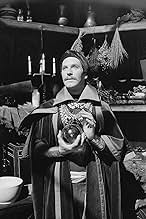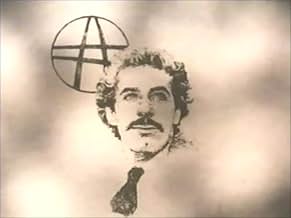AVALIAÇÃO DA IMDb
5,1/10
2,2 mil
SUA AVALIAÇÃO
Adicionar um enredo no seu idiomaA psychiatrist becomes the new Sorcerer Supreme of the Earth in order to battle an evil Sorceress from the past.A psychiatrist becomes the new Sorcerer Supreme of the Earth in order to battle an evil Sorceress from the past.A psychiatrist becomes the new Sorcerer Supreme of the Earth in order to battle an evil Sorceress from the past.
Anne-Marie Martin
- Clea Lake
- (as Eddie Benton)
Michael Ansara
- Ancient One
- (narração)
- (não creditado)
Ted Cassidy
- Demon Balzaroth
- (narração)
- (não creditado)
- Direção
- Roteiristas
- Elenco e equipe completos
- Produção, bilheteria e muito mais no IMDbPro
Enredo
Você sabia?
- CuriosidadesIn a 1985 interview, Stan Lee cited this movie as the Marvel television project of the 1970s that he wound up giving the most input, and noting he became very friendly with Writer, Executive Producer, and Director Philip DeGuere, Jr. Lee added that next to The Incredible Hulk, this was the live-action adaptation of a Marvel character with which he was most pleased at the time. Lee was disappointed by the movie's low ratings, which he attributed to being aired against Raízes (1977).
- Erros de gravaçãoIn the comic books Dr. Strange was a brilliant neurosurgeon.
- Citações
The Nameless One: Why have you spared him?
Morgan LeFay: I am still a woman. And the man attracts me.
The Nameless One: Then you find no satisfaction in my service?
Morgan LeFay: I would feel the warmth of a mans arms again... after all these years alone...
- ConexõesFeatured in The Greatest Show You Never Saw (1996)
Avaliação em destaque
The current wave of live-action cinematic superheroes is nothing new to our screens. Since 'Superman' first revolutionised the comic book industry in 1939, there have been film adaptations. In the 1940's there were many serials (Batman, Superman, and Captain Marvel for example). Then in the 1950's and 1960's The Adventures of Superman (1952 - 1958) and the campy Batman (1966 - 1968) the superheroes became household names on television. Then, in the 1970's, DC comics, through the ABC television network, produced the highly successful Wonder Woman (1975 - 1979) series, with the Amazonian beauty of Linda Carter. With the prospects of DC's most famous character's big screen incarnation, in Richard Donner's Superman: The Movie (1978), Marvel, with their groundbreaking silver-age characters, needed a platform for their characters. Whilst they had success with their animated Saturday morning shows, live-action and the TV series was the place to promote them.
From 1977 to 1982, Universal television broadcast The Amazing Spider-man (1977 - 1979), The Incredible Hulk (1978 - 1982), and two TV movies, Captain America (1979) and Captain America II: Death Too Soon (also 1979). The quality was of course varied, and the Hulk was its most credible triumph. Then in 1978, writer/producer, Philip DeGuere, produced a feature length television movie of one of Marvels most "psychedelic", cerebral characters, Doctor Strange. Created by comic legend Steve Ditko, it seems like quite a huge leap of faith to create a plausible adaptation within the restrictions of television production. This leads to some of the more fantastical elements of the comic books to be altered, or left out entirely - but this is of course an understandable exclusion.
Doctor Stephen Strange (Peter Hooten), a Psychiatrist working in a New York hospital who has been chosen by Thomas Lindmer (John Mills) to take his place as the new Sorcerer Supreme of Earth. However, an evil Sorceress, Morgan LeFay (Jessica Walter), has plans to kill the Earth- bound magicians. After throwing Thomas off a bridge, Clea Lake (Eddie Benton), has been telepathically controlled by the evil witch, Morgan, and it is down to Dr. Strange to save her from the astral plain, then conquer the cosmic universe to become the sorcerer.
It does have the limitations of 1970's television production, and falls flat very often with the dialogue - including excruciatingly annoying laughter from Strange and Clea, as they laugh at their unfunny exchanges. However, it is an admirable effort to bring a more obscure Marvel character to a live-action context. With Stan Lee as a consultant (as with all the other aforementioned shows), Lee states that this was his most enjoyable experience out of all of them. It was intended as a pilot for a series, but this was never produced - a television interview with Morgan LeFay towards the end, actually gives clues as to the way the show could have gone, and to be honest, it seems like an incredibly good concept. Morgan LeFay would have indoctrinated into her realm of magic the youth of America, through the zeitgeist idea of the self-help programme, something that was big business in the '70's. Alas, the idea was never seen through.
www.the-wrath-of-blog.blogspot.com
From 1977 to 1982, Universal television broadcast The Amazing Spider-man (1977 - 1979), The Incredible Hulk (1978 - 1982), and two TV movies, Captain America (1979) and Captain America II: Death Too Soon (also 1979). The quality was of course varied, and the Hulk was its most credible triumph. Then in 1978, writer/producer, Philip DeGuere, produced a feature length television movie of one of Marvels most "psychedelic", cerebral characters, Doctor Strange. Created by comic legend Steve Ditko, it seems like quite a huge leap of faith to create a plausible adaptation within the restrictions of television production. This leads to some of the more fantastical elements of the comic books to be altered, or left out entirely - but this is of course an understandable exclusion.
Doctor Stephen Strange (Peter Hooten), a Psychiatrist working in a New York hospital who has been chosen by Thomas Lindmer (John Mills) to take his place as the new Sorcerer Supreme of Earth. However, an evil Sorceress, Morgan LeFay (Jessica Walter), has plans to kill the Earth- bound magicians. After throwing Thomas off a bridge, Clea Lake (Eddie Benton), has been telepathically controlled by the evil witch, Morgan, and it is down to Dr. Strange to save her from the astral plain, then conquer the cosmic universe to become the sorcerer.
It does have the limitations of 1970's television production, and falls flat very often with the dialogue - including excruciatingly annoying laughter from Strange and Clea, as they laugh at their unfunny exchanges. However, it is an admirable effort to bring a more obscure Marvel character to a live-action context. With Stan Lee as a consultant (as with all the other aforementioned shows), Lee states that this was his most enjoyable experience out of all of them. It was intended as a pilot for a series, but this was never produced - a television interview with Morgan LeFay towards the end, actually gives clues as to the way the show could have gone, and to be honest, it seems like an incredibly good concept. Morgan LeFay would have indoctrinated into her realm of magic the youth of America, through the zeitgeist idea of the self-help programme, something that was big business in the '70's. Alas, the idea was never seen through.
www.the-wrath-of-blog.blogspot.com
- tomgillespie2002
- 23 de ago. de 2012
- Link permanente
Principais escolhas
Faça login para avaliar e ver a lista de recomendações personalizadas
Detalhes
- Tempo de duração1 hora 33 minutos
- Proporção
- 1.33 : 1
Contribua para esta página
Sugerir uma alteração ou adicionar conteúdo ausente

Principal brecha
By what name was Dr. Strange (1978) officially released in Canada in English?
Responda




















